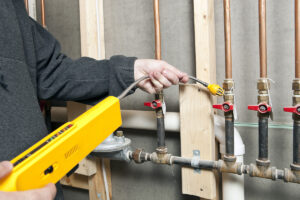
Gas line inspections are essential for maintaining a home that’s safe for you and your family.
Gas lines are a critical component of many homes, supplying fuel for cooking, heating, and hot water. However, if left unchecked, gas lines can pose serious safety risks, including leaks that could lead to fires, explosions, or carbon monoxide poisoning. Regular gas line inspections are essential for ensuring the safety of your home and family.
Why Gas Line Inspections Are Important
Gas leaks are often silent and odorless, making them difficult to detect without proper inspection. Over time, pipes can corrode, joints may loosen, and damage from external forces can occur, increasing the risk of gas leaks. Routine gas line inspections help identify these issues early, preventing potential hazards before they become dangerous.
Preventing Gas Leaks and Fires
A small gas leak can lead to major problems if left undetected. Gas is highly flammable, and even a minor spark can cause a fire or explosion. Inspections ensure that connections are secure, pipes are intact, and there are no leaks present.
Avoiding Carbon Monoxide Poisoning
Gas appliances that are not properly vented or maintained can produce carbon monoxide, an invisible, odorless gas that can be deadly. Inspecting your gas lines and appliances ensures they are functioning correctly and not emitting dangerous fumes.
Ensuring Compliance with Local Codes
Many cities and municipalities have regulations requiring periodic gas line inspections, especially during home sales or renovations. Keeping up with these inspections ensures your home remains compliant with local safety codes and regulations.
Signs You Need a Gas Line Inspection
While regular inspections are recommended, there are certain signs that indicate an immediate need for a professional assessment:
- Rotten Egg Smell – Many gas providers add a sulfur-like odor to natural gas to help detect leaks.
- Hissing Sounds – If you hear a hissing noise near your gas line, it may be a sign of a leak.
- Dead Plants or Vegetation – Unexplained plant death near gas lines could indicate an underground leak.
- Unusual Increases in Gas Bills – A sudden rise in your gas bill without increased usage might signal a leak.
- Dizziness or Nausea – Symptoms such as dizziness, headaches, or nausea may indicate exposure to gas or carbon monoxide.
What Happens During a Gas Line Inspection?
A professional gas line inspection typically includes:
- Visual Examination – Inspectors check for visible signs of wear, corrosion, or damage to gas pipes and connections.
- Leak Detection Tests – Specialized equipment is used to detect any leaks, even those too small to notice by smell alone.
- Pressure Testing – This ensures that the gas system maintains proper pressure levels without leaks.
- Appliance Check – Inspectors verify that gas-powered appliances are functioning safely and efficiently.
- Regulatory Compliance Review – Ensuring that the gas system meets all safety and building code requirements.
How Often Should You Get a Gas Line Inspection?
Experts recommend scheduling a gas line inspection at least once every one to two years. However, inspections should also be conducted:
- When purchasing or selling a home
- After any major home renovations
- If you suspect a gas leak or smell gas
- Following extreme weather events, such as earthquakes or floods, that may have damaged gas lines
Call Mahon Plumbing Today
If you still have more questions regarding your plumbing, we here at Mahon Plumbing are here to help. We have been serving the wider Baltimore area since 1994, so we have 25 years of experience to back up our fantastic service! Call us at our Baltimore location at 410-766-8566 or our Pasadena location at 410-636-7944. Be sure to keep up with us on social media by following us on Facebook or Twitter.
